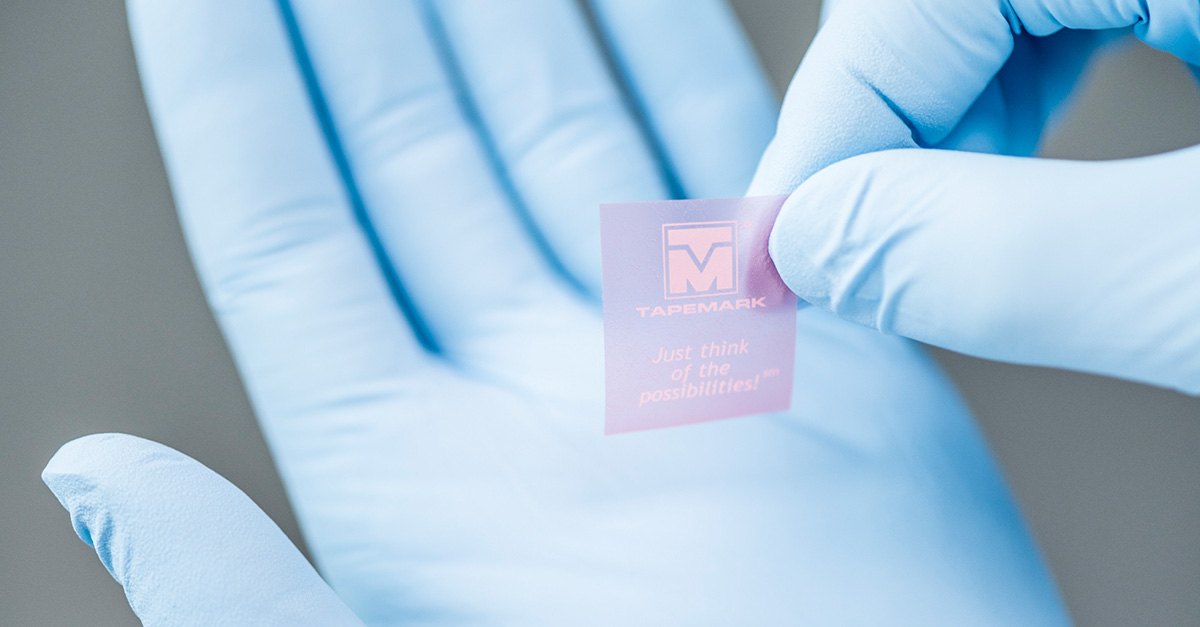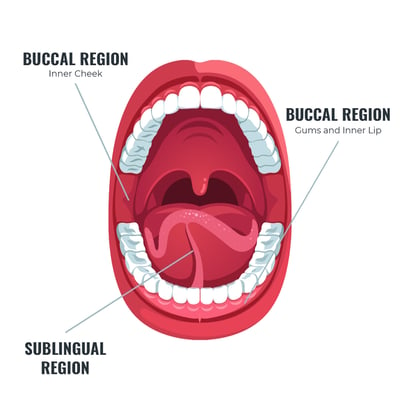Some drugs may be safely and effectively delivered across mucous membranes, like those found in the mouth and nose. This form of delivery bypasses the gastrointestinal tract completely and is referred to as transmucosal.
Transmucosal drug delivery is an exciting area of innovation for the pharmaceutical industry, as it offers many advantages over other drug delivery routes, like injections, liquid medications, and pills.
ADVANTAGES OF TRANSMUCOSAL DELIVERY
Because transmucosal delivery circumvents the GI tract, Active Pharmaceutical Ingredients (APIs) aren’t exposed to the harsh conditions of the human digestive system. For the drug manufacturer, there’s less waste of ingredients, and there’s no need to worry about adding a special coating to delay their release inside the body.
For the patient, the advantages are far more significant. Since transmucosal delivery avoids the digestive system entirely, common side effects like nausea can be eliminated, and APIs can reach the bloodstream much faster. Unlike pills or tablets, transmucosal delivery doesn’t require chewing or swallowing, or access to water.
Unlike liquid medications, any unpleasant-tasting ingredients can be masked easily. Finally, unlike injectables, there’s no discomfort or inconvenience. Together, these advantages have been shown to improve patient compliance, and therefore, deliver better outcomes.

SPECIFIC BENEFITS OF ORAL THIN FILMS
Oral thin films are an excellent example of transmucosal delivery, and they offer even more benefits to pharmaceutical companies:
- More stability
- Longer shelf life
- Easy to transport and handle
- No special packaging required
- No complicated processing
- Popular with providers and patients
WHY ARE ORAL TISSUES IDEAL FOR TRANSMUCOSAL DELIVERY?
The tissues inside the mouth have a significant amount of blood vessels, which makes it easier for APIs to enter the circulatory system. Oral thin films are specifically designed to be placed under the tongue (sublingual) or inside the cheek or lips (buccal) because those tissues are the most permeable.

Sublingual tissues are thinner but receive less blood flow, whereas buccal tissue is thicker but offers more blood flow. Depending on the oral thin film, it will be designed to be placed in a certain area. Therefore, patients should always follow their doctor’s instructions regarding placement, as it will impact delivery.
BESIDES ORAL THIN FILMS, WHAT ARE OTHER EXAMPLES OF TRANSMUCOSAL DELIVERY?
Even if you haven’t heard the term transmucosal delivery, chances are still very good that you’re already familiar with some products that use it. In addition to oral thin films, other forms of transmucosal delivery include:
- Nasal sprays
- Gels
- Foams
- Eyedrops
- Quick dissolve tablets
- Chewing gums
- Lozenges
- Suppositories
When compared to tablets and injectables, many products that use transmucosal delivery are newer. However, some fields have already found them to be a significant improvement over traditional treatment options.
DENTISTRY
While oral thin films have already been used to deliver sedatives, anti-seizure drugs, and more, delivering local anesthesia for dental procedures is particularly noteworthy. For example, in one study, lidocaine delivered transmucosally offered effective anesthesia within 15 minutes, and offered dentists 45 minutes of working time. Patients were also spared the discomfort accompanying oral injections, making transmucosal delivery especially useful for pediatric and periodontal dentistry.
PEDIATRIC MEDICINE
Bad-tasting liquid medications and anxiety and discomfort with injections make oral thin films and other transmucosal drug delivery options especially appealing for children.
GERIATRIC MEDICINE
Strokes and many Central Nervous System (CNS) conditions can cause difficulty in chewing and swallowing. Oral thin films and other alternatives to pills and tablets can help improve patient compliance and ease of care.
SPECIAL CHALLENGES OF DEVELOPING NEW ORAL THIN FILMS
Advances are being made regarding delivering water-insoluble drugs via oral thin films, but it remains a significant challenge. Currently, oral thin films can’t contain APIs greater than around 20 milligrams, so dosage is limited. Finally, testing can pose additional challenges for drug developers. For example, it is very difficult to adequately replicate saliva or conditions inside the mouth.
While demand is growing for new oral thin films, there are relatively few companies that have the facilities and the expertise required to develop them. While the challenges surrounding development and testing can represent a significant barrier to entering this market, it presents an incredible financial opportunity for those few pharmaceutical companies that are either properly equipped, or that know a Contract Development and Manufacturing Organization (CDMO) that is.
WHY PARTNER WITH A FULL-SERVICE CDMO?
A full-service CDMO like Tapemark can take your project from development all the way through commercial manufacturing and understands how to guide clients throughout the entire process. What’s more, with 15 years of experience converting and packaging soluble film, Tapemark is already the clear industry leader in oral thin film drug delivery.
Our current projects include implantable films, oral sublingual films, oral buccal films, transdermal patches, diagnostic patches, and unit dose semi-solid drug delivery systems. And while developing and manufacturing these products can be extraordinarily complex, partnering with us remains a simple, seven-step process. If you’re considering developing a new oral thin film with a CDMO, our experts will help you determine if a partnership would help you get your product to market on time, and within your budget.
